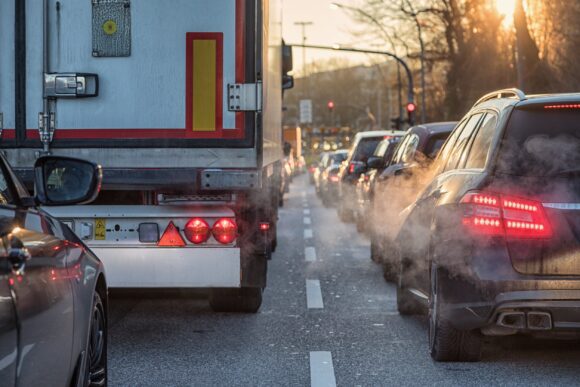California Emissions Mandate Impacts Transportation

This post is part of a series sponsored by IAT Insurance Group.
The California Air Resources Board (CARB) is doing all they can to reduce emissions.
From moving and storage vehicles to buses, freight trucks and even agribusiness vehicles previously not required to comply, the CARB regulations require engines in heavy-duty vehicles to be upgraded or retrofitted. Regardless of where the vehicle is registered, all carriers hauling freight in California are required to comply.
Combine this with the lifting of Assembly Bill 5,[1] which changed the definition of who is considered an independent contractor (IC), and there’s even more pressure being put on an already taxed industry in California.
What you need to know based on your vehicle size
Complying with these new mandates depends on your vehicle’s Engine Model Year (EMY) and the truck’s Gross Vehicle Weight Rating (GVWR). The chart below breaks down requirement deadlines to have a PM filter upgraded and installed based on a truck’s weight and year. Note that all vehicles with a 2010 EMY or newer are fully compliant.
EMY Schedule for Heavier Vehicles (>26,000 lbs.)[2]
Vehicles with an engine model year (EMY) of 2004 and earlier must have a particulate matter (PM) filter upgraded and installed by January 1, 2021.
EMY
Level 3 PM Filter
2010 EMY by
2005 or newer
January 1, 2014
January 1, 2022
2007 – 2009
If already equipped
January 1, 2023
Lighter Vehicles (14,001 – 26,000 lbs.)[3]
Lighter vehicles do not require a Level 3 PM filter per the new regulations. Vehicles with an EMY of 2003 and earlier were required to have a 2010 EMY by January 1, 2020.
EMY
2010 EMY by
2004 – 2006
January 1, 2021
2007 – 2009
January 1, 2023
Under the new regulations, refrigerated trailers and trucks may not have an engine older than seven years old. By January 1, 2022, the refrigerated unit engine could be no older than 2005. These changes incrementally, effective January 1 of every year. So, by January 1, 2023, refrigerated unit engines can be no older than 2006.[4]
How will the Department of Transportation (DOT) enforce this?
Since 2020, California Department of Transportation, known as Caltrans, has checked compliance with regulation during new vehicle registration. Vehicles that are a 2010 model or older, must have a 2010 engine by January 1, 2023, or owners will not be allowed to register their vehicle(s).
But compliance hasn’t been easy. Due to the current supply chain crisis, some motor carriers and independent contractors have been waiting for more than a year for new trucks and upgraded engines. These supply chain issues are causing truckers to consider staying off the road — and not make a living — or driving trucks illegally. Many owners may opt to keep fleets operating locally to avoid Caltrans roadside inspections and face non-compliance repercussions.
All carriers traveling into California should obtain CARB certification for their fleets. Carriers can obtain CARB certification and print certificates for drivers at www.arb.ca.gov only after fleets have reported accurate information and meet compliance standards.
For trucks that do not comply, CARB can issue Caltrans DOT blocks on vehicle registration, which forces owners to address the blocks before their vehicle can be reregistered. For this reason, many motor carriers are opting to transport goods through East Coast ports and sending the goods by rail to their West Coast location instead.
What’s the impact on independent contractors (ICs)?
All companies must upgrade or retrofit their vehicles to stay in compliance. But that’s hard for the IC, who may not have the funds to meet California’s new emission mandates.
Motor carriers may want to consider making their ICs employees to ensure drivers are meeting safety mandates and staying within compliance standards. While the combination of California emissions regulations and AB 5 pose ongoing questions, motor carriers and IC can rely on insurance brokers to find optimal solutions for coverage.
Contact IAT Insurance to learn more about how California Emissions regulations can impact commercial transportation coverage.
By Nancy Ross-Anderson, Loss Control Specialist
[1] Freight Waves “Lower court formally lifts injunction against AB5 in California trucking,” August 29, 2022.
[2] California Air Resources Board “A Guide to California’s Clean Air Regulations for Heavy Duty Diesel Vehicles,” February 2020.
[3] Ibid.
[4] Ibid.
Topics
California
The most important insurance news,in your inbox every business day.
Get the insurance industry’s trusted newsletter




